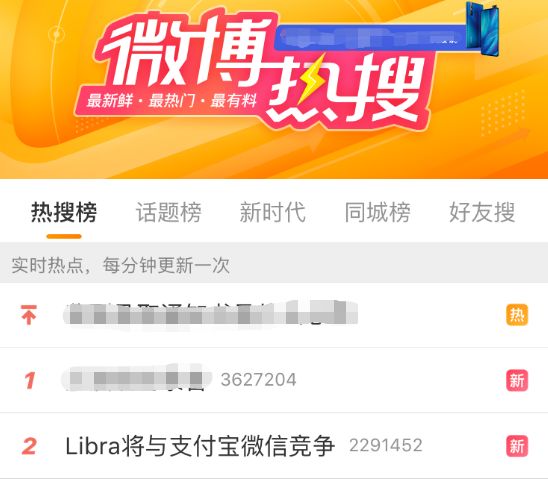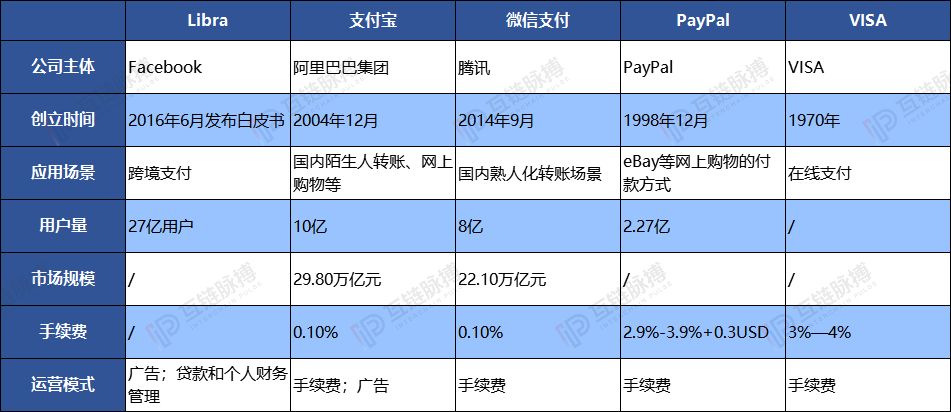Why can Libra fight against Alipay and WeChat?
"Libra will compete with Alipay WeChat" – on the first day of the release of the Libra white paper, someone said that the peacekeeping strike was said. But this is just a guess.
Until last Thursday (18th), the US House of Representatives held a hearing on the Libra project. Libra project leader Marcus even publicly admitted at the hearing that Libra will compete with Alipay and WeChat payment, and the market once again pays attention to this competition. And even boarded the second place on the Weibo hot search list.

From the bank alliance of VISA to the centralized platform PayPal, Alipay, WeChat payment, and Libra alliance. The change in the field of financial payment is nothing more than “reducing costs and improving efficiency”. From this point of view, Libra does have the ability to replace Alipay and WeChat payment.
- Getting started with the blockchain | Luo Yonghao: Most people don't understand the blockchain, so can't talk to the blockchain with friends?
- Bakkt is finally here, it’s time to buy a Starbucks with it.
- Nearly half of the UK and Americans don't believe in Facebook's Libra
Alipay and WeChat promote the development of mobile payment 2.0
The first generation of mobile payments began with VISA.
In 1970, National Bank Americar Inc. was founded and changed its name to Visa in 1976. It was also in the 1970s that very large scale integrated circuits emerged and computers were gradually used in commercial organizations. VISA combines payment with computer technology to become the first native financial technology company and the first generation of payment technology companies.
As a credit card brand, VISA is operated and managed by the VISA International Organization of the United States. Brand credit cards are issued by members of the organization (mainly banks). Thus supporting the VISA payment function is the credit of the organization and its members, and the form of advancing payment is based on the bank's alliance.
It is dedicated to helping consumers, businesses, banks and governments use digital currency. Compared to traditional payment methods, VISA reduces the time cost of payment to a certain extent and improves settlement efficiency.
However, there are still deficiencies. For example, in the case of cross-border payment scenarios, at present, cardholders spend most of their bills on credit card spending, ranging from 3% to 4%, and the handling fee is higher earlier.
With the continuous development of technology, in 1990, the Internet was open to the public.
In December 1998, PayPal was established, and the electronic payment form centered on the company's institutions and impacting the banking mechanism was put on the stage. The payment 2.0 era also kicked off.
PayPal works with e-commerce sites such as eBay as a payment method for these platforms. In December 2017, the number of PayPal users reached 227 million. In terms of cross-border payment, the PayPal binding credit card or UnionPay card transfer fee is 2.9%-3.9%+0.3USD. Although there is no obvious effect in reducing costs, there has been a big improvement in efficiency.
Under the blessing of Internet technology, payments no longer need to rely on entities such as credit cards, and payment entities can make simpler payment operations over the network.

After that, time to the 21st century, the mobile Internet combined with mobile Internet and Internet has gradually spread.
Ali Group established Alipay in December 2004; Tencent launched WeChat Pay in September 2014, and the two Chinese mobile payment agencies further increased the efficiency of mobile payments, and the cost dropped significantly.
The 2019Q1 China Third-Party Payment Quarterly Data released by iResearch, in the first quarter of 2019, the Alipay market share was 53.8% (about 29.8 trillion yuan); the WeChat payment share was 39.9% (about 22.1 trillion yuan). It is the top two in the domestic third-party payment market.
Among them, the "electronic wallet" paid by Alipay and WeChat and the bank linked by them are only 0.1%, and the payment cost is extremely low. We use Alipay and WeChat to pay WeChat payment transfer, which is confirmed in real time.
Blockchain change payment 3.0 pattern
With the birth of blockchain technology and Libra on Facebook, the payment 3.0 era has been promoted.
Even VISA, the leader in the payment 1.0 era, also took a fancy to the blockchain payment market. On June 12, VISA announced the launch of the blockchain-based cross-border payment network “B2B Connect”. It supports direct inter-bank transactions and facilitates cross-border payments for international financial institutions.
From the 2.0 era to the 3.0 era, Libra has some differences in technology and operation mode between Alipay and WeChat payment, but they are built on the existing large-scale technology platform supported by the Internet and mobile communication to provide convenience and low cost. The payment service is the starting point and is linked to legal tender.
Libra is aiming at cross-border transactions, and Alipay and WeChat payment are also expanding in the international market, so mutual competition is inevitable.
But Libra's ambitions seem to be greater than the achievements of Alipay and WeChat payment. It is attached to a basket of currencies and is backed by Facebook's 2.7 billion users. Once successful, it will create a new "world currency."
Libra's white paper reveals that interest on Libra's reserve assets will be used to ensure low transaction costs. The reason behind it is also very simple. The original Alipay and WeChat payment did not want to charge a fee, but the bank received it, and it was forced to accept it. Otherwise, Alipay and WeChat will lose more and more.
Libra does not have banks to make settlements, clearing, transfer, etc., so it can control the low fees. Libra will direct payments to a more cost-effective and efficient direction.
When cost and efficiency are largely in line with people's needs, it is not impossible to replace Alipay and WeChat.
Just now, it’s still too early. Libra is not like WeChat and Alipay. It is a payment method with effective supervision and protection. It is still facing global regulatory issues and even privacy protection issues.
Therefore, it has been suggested that Libra is unlikely to pose a major challenge to the local market of WeChat payment and Ali payment due to the limited internationalization of the RMB. If Libra is successfully issued, it may promote Alipay and WeChat payment to further develop in the international market.
This article is [inter-chain pulse] original, the original link: https://www.blockob.com/posts/info/18599 , please indicate the source!
The original question "Why can Libra fight Alipay and WeChat? Because of lowering costs and improving efficiency"
Author: Mutual chain pulse King-propelled vehicle
We will continue to update Blocking; if you have any questions or suggestions, please contact us!
Was this article helpful?
93 out of 132 found this helpful
Related articles
- Blockchain Industry Weekly | Firecoin Hong Kong stock platform acquires Japanese IDC assets, Facebook hearing is not yet to be continued
- Mercedes-Benz parent company Daimler loves the blockchain and wants to develop an open car hardware wallet solution
- Jingdong Cloud launched the problem that Zhiyun chain “cloud” planning has to face
- Libra coins will threaten to compete with WeChat and Alipay. Can Chinese companies be able to stand up?
- Iran officially legalizes bitcoin mining, low electricity prices or attracts a large number of miners
- Libra debuts at the US Congress hearing; Bakkt bitcoin futures will begin testing
- What will Serenity bring?






